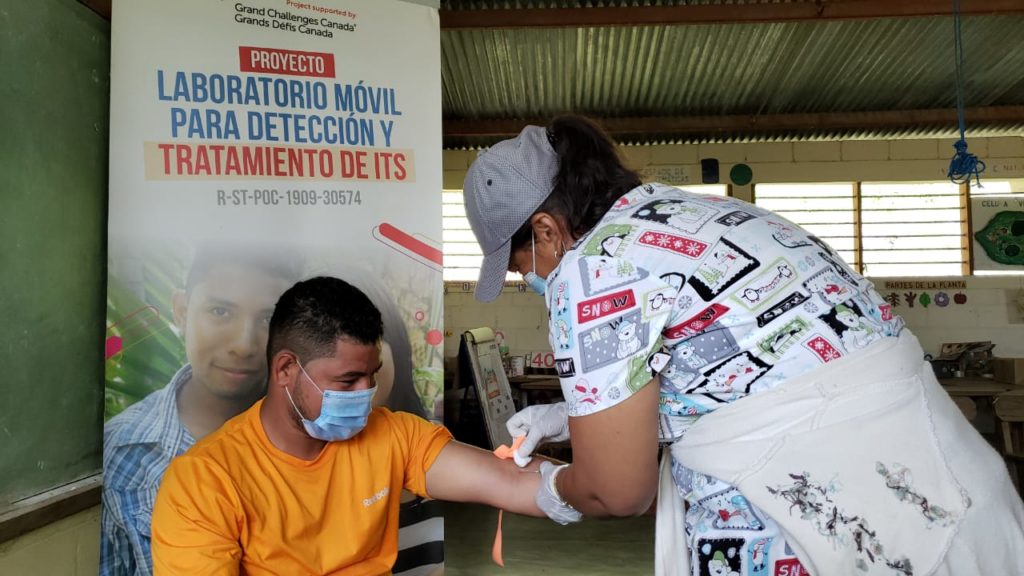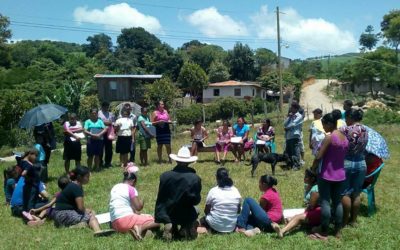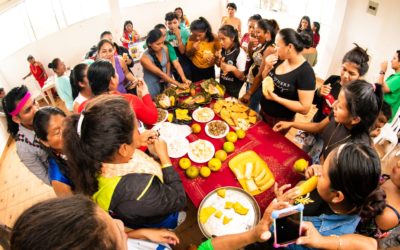🇭🇳 The Mobile Laboratory Project provides care to detect Sexually Transmitted Infections (STIs) and provides guidance on the importance of enjoying good sexual and reproductive health in rural areas of Honduras. Its implementation aims to strengthen the public health system of this country, offering a sustainable and inclusive tool.
A mobile laboratory unit, implemented in rural communities and provided with the necessary elements to take samples for the detection of Sexually Transmitted Infections (STIs) is the innovative initiative that the consortium made up of Fundación Ayuda en Acción, Fundación en Acción Humanitaria de Honduras (FUNACH) and Fundación de Waal have launched with funding from Grand Challenges Canada in the Central American country. The program provides guidance and different tools to educate people about sexual and reproductive health and rights.
The mobile laboratory aims to provide adequate treatment for these types of diseases and also to create awareness in the population of rural areas, so that they take care of this area of their health in a responsible way. It is currently being carried out in 10 health units in the department of Yoro, Honduras, this is a project that contributes to saving lives and improving the health of vulnerable populations such as women, adolescents and newborns. by increasing access to technologies and interventions that ensure low-cost care. It addresses the problem of isolation in poor rural populations and the centralization of health services, as well as the economic barrier imposed by the current cost of detecting and treating STIs. It also strengthens the public health system by providing it with a tool to expand coverage in a sustainable way.
Rossely Medina, Technical Coordinator of the Waal Foundation in Honduras, explains that this project consists of bringing health services closer to the population living in underserved communities and part of a reality of low detection and lack of timely treatment of STIs, due to geographical and economic barriers and the lack of supplies in health units. “The detection and treatment of STIs are not provided by the public health system. Only private health providers provide this service, but the costs are too high and only It can be found in the main cities of Honduras ”, he indicates. Faced with this reality, the mobile unit is able to provide a solution to the public health system so that you can offer a service that is not currently available and that is essential. The late detection or lack of diagnosis of Sexually Transmitted Infections puts the health of women, especially adolescents, at risk during pregnancy and childbirth, also putting the health of the newborn at risk.
According to the existing model, a patient who visits a health unit is referred to a laboratory located five hours from his hometown. Diagnosis takes an average of 196 days from sample collection and cost is $ 587. The innovation, proposed through the mobile laboratory, is capable of reducing this cost by 94% and the diagnosis and provision of treatment takes just 30 days. “It also paves the way towards a relationship of trust and proximity that allows health workers to provide information and raise awareness about sexual and reproductive rights,” he says.
Fundación de Waal was linked to this initiative since July 2019, through a Cooperation Agreement with Fundación Ayuda en Acción, and Their participation consists of leading the training processes for the population, health authorities and all those involved in the project, focusing on the issues of Sexual and Reproductive Health and Rights.
Training, both for health personnel, As well as community volunteers, it emphasizes the importance of prevention and timely detection of STIs. The trained personnel, in turn, must carry out awareness-raising actions with the Target Population, which is made up of men and women of childbearing age, pregnant women and adolescents. The messages that are transmitted are based on the approaches of equality, interculturality and human rights.

“To achieve these objectives, it has begun with the training of health personnel and volunteers, providing them with the necessary information and supplies so that they can carry out multiplier effect actions in their communities with the population described above. In order to ensure that those who are being trained reach an adequate understanding of the knowledge, we are working with specific material for each type of population, that is, their level of instruction and their reading and writing skills have been considered ”, indicates Rossely Medina .
The strategy consists of generating an educational pyramid, at the top of which is the training officer or facilitator who leads the process together with several participants, who in turn carry out the multiplier effect aimed at adolescents, men and women of childbearing age and pregnant women. , with the purpose of modifying their knowledge, attitudes and practices, to achieve the reduction of the prevalence of STIs in their communities.
The results that have been achieved so far are counted in the training of 53 health professionals and 39 volunteers and promoters of 9 health units, located in the municipalities of Yorito, Sulaco and Yoro, in the department of Yoro. As well as raising awareness in the general population of these localities about the importance of caring for the sexual health of the couple, as well as making timely detections of STIs. In addition to providing information to the population about the different sexually transmitted diseases and how to prevent them.

One of the aspects that should be highlighted is that the implementation of this Project occurred in the midst of the health emergency caused by the Covid-19 pandemic and two hurricanes that affected Honduras. The resilient and timely management of these crises and the fulfillment of the goals set, in the midst of difficulties, has left a series of lessons learned and good practices.
“The intention is to seek in the near future an escalation of the model implemented with the project in order to benefit a greater number of the population and reach other communities, which due to their geographical conditions do not they have the necessary health services. Similarly The aim is to give sustainability to the activities carried out in the 10 existing health units, in order to propose an improvement in care, especially for women, who due to their condition have serious difficulties in accessing sexual and reproductive health services ”, says Rossely Medina.



